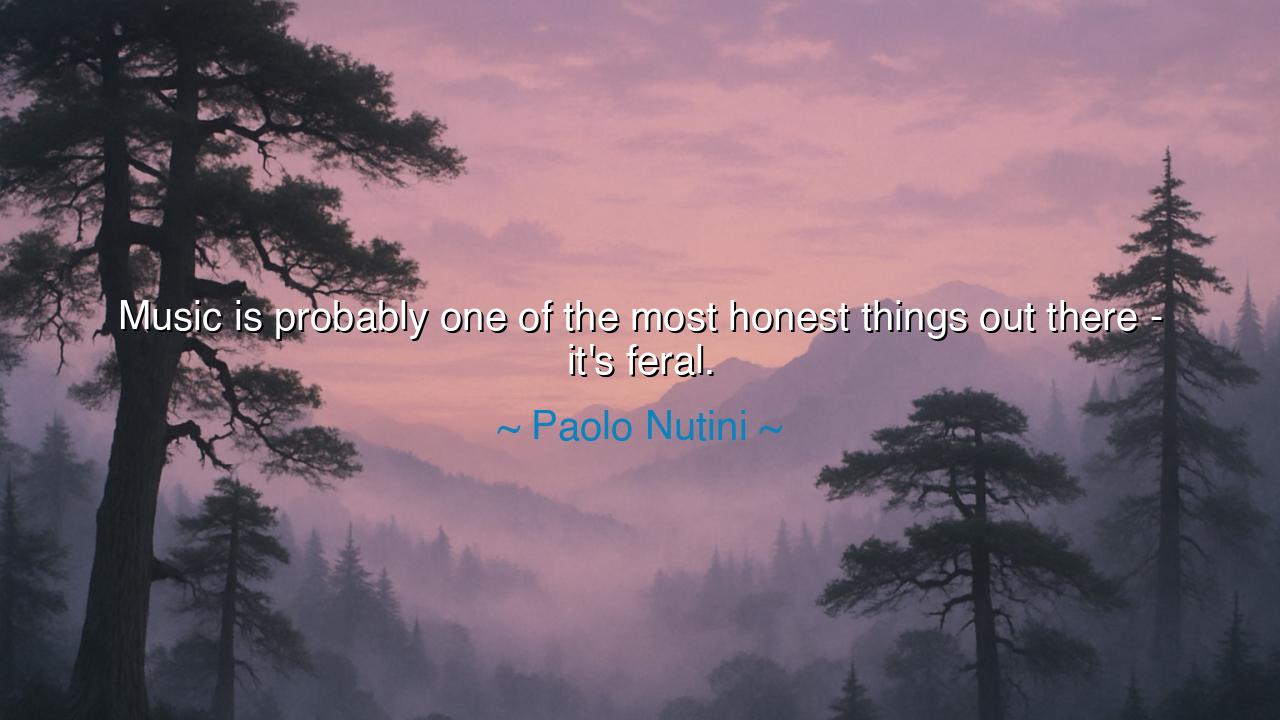
Music is probably one of the most honest things out there - it's






"Music is probably one of the most honest things out there—it’s feral." Thus spoke Paolo Nutini, and in his words lies a truth as raw and untamed as the sound he describes. For music, in its deepest form, is not polite nor restrained, not dressed in lies nor hidden behind masks. It is primal, wild, ungoverned—a creature of the heart that refuses chains. To call it feral is to recognize that it springs from a place beyond reason, beyond calculation, beyond the cages of society. It belongs not to order, but to the soul’s wilderness.
The origin of this truth is as old as humanity. Before there was writing, before there was philosophy, before there were laws, there was music. The rhythm of drums in the dark forests, the cries of the voice echoing in caves, the hum of mothers to their children—these were the first languages of our species. It was not planned nor refined; it was instinctive, erupting like fire from the heart. This is why Nutini calls it honest: because unlike words, which can deceive, music reveals what is hidden, often against the will of the one who creates it.
History confirms this untamed power. When Billie Holiday sang Strange Fruit, she did not offer a carefully crafted argument—she released a cry of grief and rage against the lynching of her people. That song, raw and trembling, was too honest to be ignored. It unsettled, it haunted, it cut through denial. In its feral nature lay its strength, for it could not be tamed into comfort. It forced truth upon those who listened.
The ancients themselves knew this paradox: that music both unites and disrupts, heals and wounds, comforts and agitates. Plato feared its power to stir rebellion; yet prophets used it to call their people back to courage. The Hebrew psalms wept openly before God, their cries more honest than sermons. The Spartans sang in battle, their voices fierce as wolves, carrying defiance even into death. In all these, music was not civilized decoration, but wild fire, searing truth into the air.
The meaning, then, is clear: in a world of masks, music tears them away. In a culture where words are twisted, where appearances deceive, where men pretend, music remains feral and honest. It tells what the heart feels, even when the lips deny it. That is why the broken find healing in song, why the angry find release in rhythm, why the joyful burst into melody without planning. For in music, the soul refuses to be silenced.
The lesson for us is this: do not fear the wildness of truth. Seek out the music that unsettles you, that challenges you, that reveals what you hide. When you create, do not polish away all the roughness—let your work be a little feral, for in that wildness lies its honesty. And when you hear another’s song, listen not only with your ears but with your heart, for in its untamed cry may be the truth you need most.
Practical wisdom calls us: sing when words fail, play when silence is too heavy, let the untamed voice within you find its path into the world. Keep a song close when despair grows, for music will speak where reason cannot. And remember always that the songs most honest are often those least controlled. In them lies the wild heartbeat of what it means to be human.
Therefore, children of tomorrow, take Paolo Nutini’s wisdom to heart: let music remind you of what is real. It is not meant to be caged in perfection, but unleashed in truth. It is the wild animal of the soul, roaming free, howling its honesty to the night. Honor it, let it teach you, and let it awaken the feral, untamed courage within your own heart.






AAdministratorAdministrator
Welcome, honored guests. Please leave a comment, we will respond soon